Mechanical Vs Membrane Keyboard – Which One Should I Choose?

When choosing a keyboard, there are two main types: mechanical and membrane. Both have pros and cons; ultimately, the choice comes down to personal preference and intended use.
In this article, we’ll explore the differences between mechanical and membrane keyboards, as well as the advantages and disadvantages of each.
Mechanical keyboards use individual switches for each key, which provide tactile feedback and a satisfying click sound when pressed. They are generally more durable than membrane keyboards, with some models boasting lifespans of up to 50 million keystrokes.
On the other hand, membrane keyboards use a rubber dome under each key that collapses when pressed, registering the keystroke. They are often quieter than mechanical keyboards and more affordable as well.
But which one is right for you? Let’s dive in and find out.
Mechanical Vs Membrane Keyboard – Which One Should I Choose?
| Aspect | Mechanical Keyboard | Membrane Keyboard |
| Typing Experience | Provides tactile feedback and satisfying key presses | Generally lacks tactile feedback and feels mushy |
| Key Activation | It requires more force and provides a clicky sound | Requires less energy and provides a quieter typing experience |
| Durability | Typically more durable and long-lasting | Generally less stable and prone to wearing out |
| Customization | Offers extensive customization options (keycaps, switches) | Limited customization options |
| Gaming Performance | Preferred by gamers for precise key presses and responsiveness | Suitable for casual gaming |
| Price | Generally more expensive compared to membrane keyboards | Usually more affordable |
| Noise Level | It can be louder due to clicky switches | Quieter due to rubber dome switches |
| Overall Preference | Preferred by enthusiasts, typists, and gamers | Suitable for general use and budget-conscious users |
When choosing a keyboard, the decision often boils down to two types – mechanical and membrane keyboards. Both have pros and cons, ultimately depending on personal preference.
Mechanical keyboards have individual switches for each key, providing tactile feedback and a satisfying click sound. One advantage of mechanical keyboards is their durability. The controls are designed to last longer than rubber domes, making them ideal for heavy typists or gamers who frequently use their keyboards. Additionally, mechanical keyboards offer customization options with different switch types and keycaps available for purchase. This allows users to tailor their typing experience to their preferences.
On the other hand, membrane keyboards use a rubber dome beneath the keys to register keystrokes. Membrane keyboards are generally more affordable than mechanical ones and can be found in most laptops or pre-built desktops. They also tend to be quieter than their mechanical counterparts, making them a good option for those working in shared spaces or at night. However, they may not be as responsive as mechanical keyboards due to the rubber dome mechanism.
In summary, choosing between a mechanical or membrane keyboard depends on individual needs and preferences. Consider factors such as durability, typing experience, noise level, and customization options before deciding. The following section will dive deeper into what makes up a membrane keyboard.
What Are Membrane Keyboards?
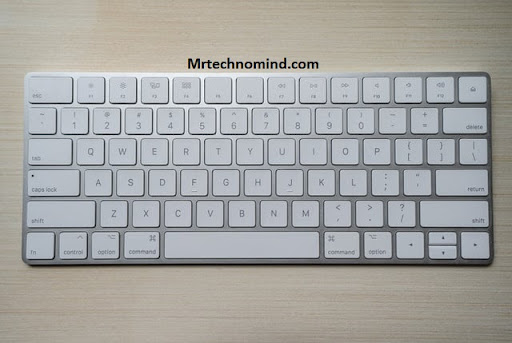
| Description | Details |
| Construction | It consists of a single rubber dome or membrane layer that houses all the keys |
| Key Structure | Each key has a rubber dome or membrane that collapses when pressed, making contact with a circuit beneath. |
| Tactile Feedback | Typically lacks tactile feedback and provides a mushy feel |
| Key Activation Force | Requires less force to activate the keys compared to mechanical keyboards |
| Noise Level | Quieter compared to mechanical keyboards due to the rubber dome construction |
| Durability | Generally less durable compared to mechanical keyboards |
| Customization Options | Limited customization options for keycaps and switches |
| Cost | Membrane keyboards are usually more affordable compared to mechanical keyboards. |
| Typical Usage | Commonly used in budget-friendly keyboards, office environments, and general typing purposes. |
| Gaming Performance | Suitable for casual gaming but may not offer the same precision and responsiveness as mechanical keyboards. |
| Pros | Affordable, quieter, and suitable for general typing tasks |
| Cons | Lacks tactile feedback, may feel mushy, and has lower durability compared to mechanical keyboards |
Membrane keyboards are a type of keyboard that use a thin, flexible membrane layer beneath the keys to register keystrokes. This design differs from mechanical keyboards, which use individual switches for each key.
Membrane keyboards have existed for many years and are still popular today because they are more affordable than mechanical keyboards. One of the benefits of membrane keyboards is that they are often quieter than mechanical keyboards. This can be especially important if you work in a shared space or prefer a more tranquil typing experience.
Additionally, membrane keyboards require less force to press down on the keys, making them easier to use for extended periods. Another advantage of membrane keyboards is that they are typically more spill-resistant than mechanical keyboards. The membrane layer helps protect the inner workings of the keyboard from damage due to spills or other accidents. This can be especially useful if you frequently eat or drink at your desk while working.
Overall, there are certainly some benefits to using a membrane keyboard over a mechanical one. While some users may prefer a mechanical keyboard’s tactile feedback and responsiveness, others may find that a membrane keyboard better suits their needs due to its affordability, quietness, and spill resistance. In the next section, we will explore the additional benefits of using a membrane keyboard that may help you decide between this type and a mechanical one.
Benefits of a Membrane Keyboard
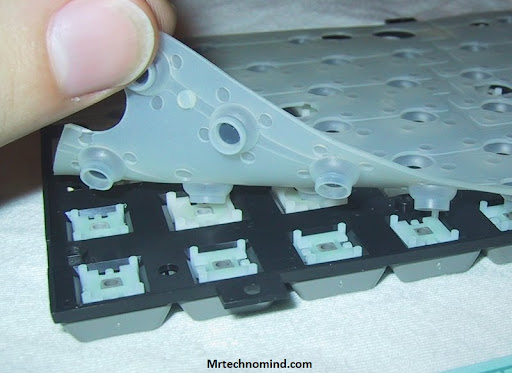
| Benefits of Membrane Keyboards |
| Affordable: Membrane keyboards are generally more budget-friendly. |
| Quieter Operation: They produce less noise during typing compared to mechanical keyboards. |
| Comfortable Typing: The membrane keys provide a softer, cushioned feel while typing. |
| Spell Resistance: Membrane keyboards are often designed to be spill-resistant, protecting against liquid damage. |
| Low Profile: They have a slim and compact design for space-constrained environments. |
| Lower Activation Force: They require less force to press the keys, reducing typing fatigue. |
| Reliability: Membrane keyboards have a simple design and can be highly reliable with proper usage and maintenance. |
Membrane keyboards are the ultimate solution for those who enjoy a smooth and effortless typing experience. Their soft and responsive keys provide a seamless feel that can delight typing. Typing on them feels like gliding your fingers over silk – it’s that smooth!
The keyboard’s keys are designed to have a low-impact keystroke, which helps reduce the risk of repetitive strain injury (RSI) and other related conditions.
Another benefit of membrane keyboards is their durability. They are built to last and withstand heavy usage without any wear or tear. The keys are covered with a thin rubber layer, protecting them from dust, water spills and other damage. This makes them perfect in harsh environments such as factories or workshops where dust or debris could quickly accumulate.
Membrane keyboards also come with additional features that make them more convenient than mechanical ones. For example, they usually have multimedia keys that allow you to control volume, playback, pause or skip tracks without leaving your keyboard. They also tend to be quieter than mechanical keyboards, which is great if you work in an open office environment.
In summary, membrane keyboards offer several advantages over mechanical ones – they’re smoother, quieter, durable and often more convenient. However, before deciding which type of keyboard to choose, it’s essential to consider some of their downsides too.
Downsides of Membrane Keyboards
| Downsides of Membrane Keyboards |
| Limited Tactile Feedback: Membrane keyboards often lack the satisfying tactile feedback of mechanical keyboards. |
| Mushy Feel: The keys can feel soft and mushy, which may affect typing accuracy and speed for some users. |
| Durability Concerns: Membrane keyboards are generally less durable than mechanical ones, and the rubber domes may wear out over time. |
| Limited Customization: Limited options exist for customizing keycaps and switches on membrane keyboards. |
| Key Ghosting and Rollover Issues: Some membrane keyboards may have limitations with simultaneous key presses, leading to key ghosting or rollover issues. |
| Gaming Performance: Membrane keyboards may not offer the same level of precision and responsiveness as mechanical keyboards, making them less ideal for gaming enthusiasts. |
Now that we’ve discussed the benefits of a membrane keyboard, it’s essential also to consider its downsides.
One major issue with membrane keyboards is their lack of tactile feedback. Unlike mechanical keyboards with individual switches for each key, membrane keyboards use a rubber dome that requires more force to push down and register a keystroke. This can lead to slower typing speeds and increased strain on your fingers over time.
Another downside of membrane keyboards is their durability. Since they rely on a thin layer of plastic to cover the circuits underneath, they are more prone to wear and tear than mechanical keyboards. This can result in unresponsive or failing keys, forcing you to replace the entire keyboard.
In addition, membrane keyboards are often criticized for their lack of customization options. While some models may allow you to change the backlight’s colour or program-specific keys, many don’t offer much personalization beyond basic settings.
Despite these drawbacks, many still prefer using a membrane keyboard for its quiet and soft typing experience.
However, if you’re looking for something more durable and customizable, it may be worth considering a mechanical keyboard instead.
So what exactly are mechanical keyboards? Simply put, they use individual switches rather than rubber dome-like membrane keyboards for each key. This allows for faster response times and greater precision when typing or gaming.
But before we delve into their advantages over membrane keyboards, let’s first look at how they work.
What Are Mechanical Keyboards?
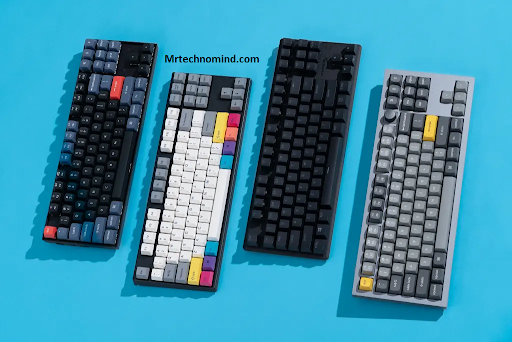
| Description | Details |
| Construction | It consists of individual mechanical switches for each key, with each button having its own spring and housing |
| Key Structure | Each key contains a mechanical switch, which provides a tactile bump and audible click when pressed. |
| Tactile Feedback | Offers tactile feedback, providing a satisfying sensation with a noticeable bump when pressing each key |
| Key Activation Force | Requires more force to activate the keys compared to membrane keyboards |
| Noise Level | Mechanical keyboards can be louder due to the audible click generated by the switches. |
| Durability | Typically more durable and long-lasting compared to membrane keyboards |
| Customization Options | Provides extensive customization options for keycaps and switches, allowing for personalized setups |
| Cost | Mechanical keyboards are generally more expensive compared to membrane keyboards. |
| Typical Usage | Preferred by enthusiasts, typists, and gamers for their tactile feedback and precise key presses |
| Gaming Performance | Gamers highly regard them for their responsiveness, accuracy, and anti-ghosting capabilities. |
| Pros | Tactile feedback, durability, extensive customization options, precise key presses |
| Cons | Higher cost, louder noise level, and higher activation force may not suit all typing preferences. |
Are you tired of using a keyboard that feels like typing on a piece of cardboard? Look no further than mechanical keyboards! These technological marvels are the pinnacle of keyboard design, offering an unparalleled typing experience.
Mechanical keyboards utilize individual mechanical switches for each key, providing tactile feedback and a satisfying click sound with every press. This makes typing more enjoyable and allows for greater accuracy and faster speeds. It’s like playing an instrument – each keystroke has its unique feel and sound.
Picture yourself sitting at your desk, fingers flying across the keyboard as you write the next great American novel. With a mechanical keyboard, this could be your reality.
The keys are durable and long-lasting, ensuring that you won’t have to replace your keyboard anytime soon. Many models offer customizable keycaps and backlighting options for a personalized touch.
But the benefits don’t stop there. Mechanical keyboards also offer improved ergonomics, reducing strain on your fingers and wrists during extended use. And because they don’t require as much force to press as membrane keyboards, they can help prevent repetitive strain injuries such as carpal tunnel syndrome.
As you can see, there are many reasons why a mechanical keyboard is the way to go. From their superior typing experience to their durability and ergonomic benefits, they truly are the cream of the crop for computer peripherals.
So why settle for less when you can elevate your typing game with a mechanical keyboard?
The Benefits of a Mechanical Keyboard
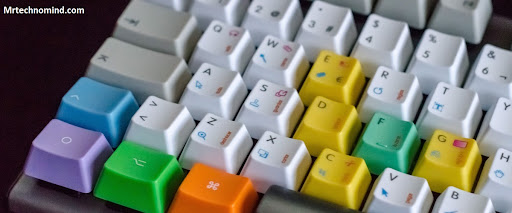
| Benefits of Mechanical Keyboards |
| Tactile Feedback: Mechanical keyboards provide a satisfying tactile bump when pressing each key, enhancing typing accuracy and speed. |
| Durability: Mechanical keyboards are typically more durable and long-lasting compared to membrane keyboards, making them a reliable choice. |
| Customization: They offer extensive customization options for keycaps and switches, allowing users to personalize their keyboard’s appearance and feel. |
| Typing Experience: The tactile feedback and different key presses of mechanical keyboards make typing more enjoyable and satisfying. |
| Gaming Performance: Mechanical keyboards are highly regarded by gamers for their responsiveness, anti-ghosting capabilities, and precise key presses. |
| Ergonomics: Some mechanical keyboards offer ergonomic designs and features that promote better typing posture and reduce strain on hands and wrists. |
| Longevity: With replaceable switches and keycaps, mechanical keyboards can be easily repaired or upgraded, extending their lifespan. |
| Key Rollover: Mechanical keyboards often have a better key rollover, allowing multiple key presses to be registered simultaneously without conflicts. |
Now that we understand mechanical keyboards let’s explore the benefits of using one over a membrane keyboard. Mechanical keyboards have become increasingly popular among gamers, programmers, and typists due to their unique features and advantages.
Firstly, mechanical switches have a longer lifespan compared to membrane switches. Membrane keyboards typically last for around 5 million keystrokes, while mechanical ones can last for up to 50 million. This means you won’t need to replace your keyboard as often, saving you both time and money in the long run.
Another advantage of mechanical keyboards is their tactile feedback and audible click sound. When typing on a membrane keyboard, there is no physical feedback or sound when pressing down a key. However, with a mechanical keyboard, you’ll feel a satisfying “click” with each keystroke. This helps you type more accurately and efficiently since you’ll know exactly when a key has been registered.
In addition to these benefits, mechanical keyboards offer customization options that allow users to personalize their typing experience. Many mechanical keyboards have programmable keys that can be assigned macros or specific functions. They often have removable keycaps that can be replaced with different colours or designs.
As you can see, there are many benefits to using a mechanical keyboard over a membrane keyboard. From their longer lifespan to their tactile feedback and customization options, they offer an enhanced typing experience. The following section will explore some potential downsides of using a mechanical keyboard.
Downsides of Mechanical Keyboards
| Downsides of Mechanical Keyboards |
| Higher Cost: Mechanical keyboards are generally more expensive than membrane keyboards, which can deter budget-conscious users. |
| Noise Level: The audible click or clack sound produced by mechanical keyboards can be louder and potentially disruptive in quiet environments. |
| Higher Activation Force: Mechanical switches typically require more force to activate, which may increase finger fatigue during long typing sessions. |
| Limited Portability: Mechanical keyboards are often bulkier and heavier compared to compact membrane keyboards, making them less portable. |
| Learning Curve: The unique characteristics of mechanical keyboards, such as switch types and keycap profiles, may require an adjustment period for new users. |
| Limited Waterproofing: Mechanical keyboards are generally less resistant to liquid spills than some membrane keyboards, which can pose a risk in specific environments. |
| Limited Availability: Depending on your location, finding specific mechanical keyboard models or switch types may be more challenging than membrane keyboards. |
As the saying goes, every rose has its thorn. So does every mechanical keyboard. While they offer many benefits, there are some downsides to consider before purchasing.
Firstly, mechanical keyboards tend to be louder than their membrane counterparts. The clicking sound of each keypress can become bothersome to those around you, especially if you spend long periods typing or gaming.
Secondly, mechanical keyboards are often more expensive than membrane keyboards. The high-quality switches and materials used in their construction drive up the price tag. This may not be an issue of severe gamers or typists prioritising performance and durability over cost, but it could be a deal-breaker for casual users.
Thirdly, mechanical keyboards are typically heavier and bulkier than membrane keyboards. While this added weight could provide stability and prevent slipping during use, it can also make them less portable and take up more desk space.
Lastly, some people prefer the feel of membrane keyboards over mechanical ones. The softer feel of the keys and the absence of the clicking sound may be more comfortable for some individuals.
Despite these downsides, many people still opt for mechanical keyboards for superior performance and durability. However, whether a mechanical or membrane keyboard is better depends on your preferences and needs.
So which one should you choose? Let’s explore that question in the next section.
Which One is Better?
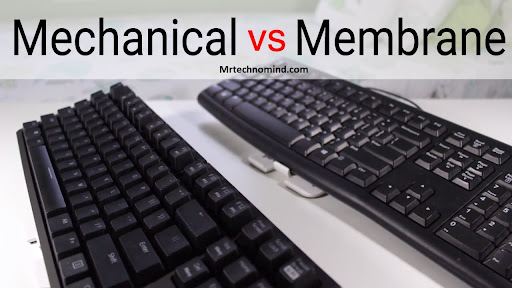
| Factors to Consider | Mechanical Keyboard | Membrane Keyboard |
| Typing Experience | Provides tactile feedback, satisfying key presses | Lacks tactile feedback, keys may feel mushy |
| Noise Level | It can be louder due to audible click or clack sound | Quieter operation |
| Durability | Generally more durable and long-lasting | Generally less durable |
| Customization Options | Extensive customization options for keycaps and switches | Limited customization options |
| Cost | Generally more expensive compared to membrane keyboards | Usually more affordable |
| Gaming Performance | Preferred by gamers for precise key presses and responsiveness | Suitable for casual gaming |
| Preference for Quiet Operation | Not ideal if you require a quiet keyboard | The quieter operation may be preferred |
| Preference for Budget-friendly Option | This may be a concern if you’re on a tight budget | More affordable option |
| Preference for Portability | It tends to be bulkier and less portable | Slim and compact design, more portable |
| Preference for Spill Resistance | Maybe less resistant to liquid spills compared to membrane keyboards | Often designed to be spill-resistant, offering protection against liquid damage |
| Preference for Tactile Feedback | Preferred if you enjoy the tactile feel of each key press | It may not be a significant factor if tactile feedback is not important |
Although mechanical keyboards have many advantages, they also have some downsides. For example, they can be pretty loud, which may not be ideal if you work in an office or live with others who are easily disturbed by noise. Additionally, mechanical keyboards tend to be more expensive than their membrane counterparts.
However, despite these downsides, many people still prefer mechanical keyboards over membrane ones. One reason for this is the tactile feedback that mechanical switches provide. This feedback makes it easier to type quickly and accurately because you can feel when each key has been pressed. Additionally, some people find that the durability of mechanical keyboards is worth the investment.
Ultimately, choosing a mechanical or membrane keyboard is a matter of personal preference. Here are a few factors to consider when making your decision:
– Type of use: If you’re using your keyboard for gaming or other tasks that require quick and accurate typing, a mechanical keyboard may be your best bet.
– Noise level: If you need to keep noise to a minimum or share your workspace with others sensitive to noise, a membrane keyboard may be better.
– Budget: Mechanical keyboards tend to be more expensive than membrane ones, so if cost concerns you, a membrane keyboard may be the way to go.
Both types of keyboards have their pros and cons. It’s up to you to decide which one best fits your needs and preferences. So take some time to consider what’s most important to you in a keyboard before making your choice.
Frequently Asked Questions
1. How Does the Lifespan of a Mechanical Keyboard Compare to That of a Membrane Keyboard?
While many people prefer membrane keyboards for their affordability, it’s essential to consider the lifespan of these keyboards compared to mechanical ones.
While a membrane keyboard may seem more practical initially, they often have a shorter lifespan and are prone to wearing out faster than their mechanical counterparts.
However, one anticipated objection to this argument is that some users don’t need a keyboard that will last for years and are content with replacing it every few months.
Nevertheless, those who want a reliable and long-lasting keyboard should consider investing in a mechanical one for its durability and superior performance.
2. Are Mechanical Keyboards Louder Than Membrane Keyboards When Typing?
Mechanical keyboards tend to be louder than membrane keyboards when typing due to how they are constructed. The individual switches on a mechanical keyboard create a distinct clicking sound that some users find satisfying while others may find distracting or annoying.
In contrast, membrane keyboards use a rubber dome beneath the keys to providing feedback, resulting in a quieter typing experience. When considering which type of keyboard to choose, it’s important to consider noise level and factors such as critical travel distance and tactile feel.
3. Are There Any Ergonomic Differences Between Mechanical and Membrane Keyboards?
When it comes to typing, the keyboard you choose can make all the difference in comfort and productivity. Ergonomic design is crucial, as it can prevent strain on your hands and wrists over time.
While there are no significant differences between mechanical and membrane keyboards regarding ergonomics, some feature adjustable critical switches for a more personalized feel, additionally, some models come with wrist rests or angled designs that can further enhance your typing experience.
Ultimately, it’s essential to find a keyboard that feels comfortable and intuitive for you personally, whether mechanical or membrane.
4. Can I Use a Mechanical Keyboard for Gaming or is a Membrane Keyboard Better Suited for This?
If you’re an avid gamer, you may wonder whether a mechanical or membrane keyboard is better suited for your needs.
The truth is, both types of keyboards can be used for gaming, but there are some key differences to consider.
Mechanical keyboards generally have a more tactile feel and quicker response time, which can benefit fast-paced games requiring quick reflexes.
However, membrane keyboards are often quieter and less expensive, making them a good choice for gamers on a budget who don’t want to disturb others in their household.
Ultimately, the decision between a mechanical or membrane keyboard comes down to personal preference and what features are most important to you as a gamer.
5. Do Mechanical Keyboards Require More Maintenance Than Membrane Keyboards?
When comparing mechanical keyboards to membrane keyboards, one question often arises is whether or not mechanical keyboards require more maintenance.
While it’s true that mechanical keyboards have more moving parts and are generally larger than membrane keyboards, they don’t necessarily require more upkeep.
Some people find mechanical keyboards easier to clean because the keys can be removed and cleaned individually.
Additionally, many high-quality mechanical keyboards are built to last for years without major repairs or replacements.
Ultimately, the decision between a mechanical keyboard and a membrane keyboard should come down to personal preference and intended use rather than maintenance concerns.
Conclusion
In conclusion, when it comes to choosing between a mechanical and membrane keyboard, it ultimately depends on personal preference and usage.
While some may prefer the tactile feedback and durability of a mechanical keyboard, others may find the quieter typing experience of a membrane keyboard more appealing.
Before deciding, it is essential to consider factors such as lifespan, noise level, ergonomics, and maintenance requirements.
Ultimately, whichever keyboard you choose should provide comfort and ease of use for your specific needs. So make your choice confidently, knowing that both types have benefits and drawbacks depending on what you’re looking for in a keyboard.